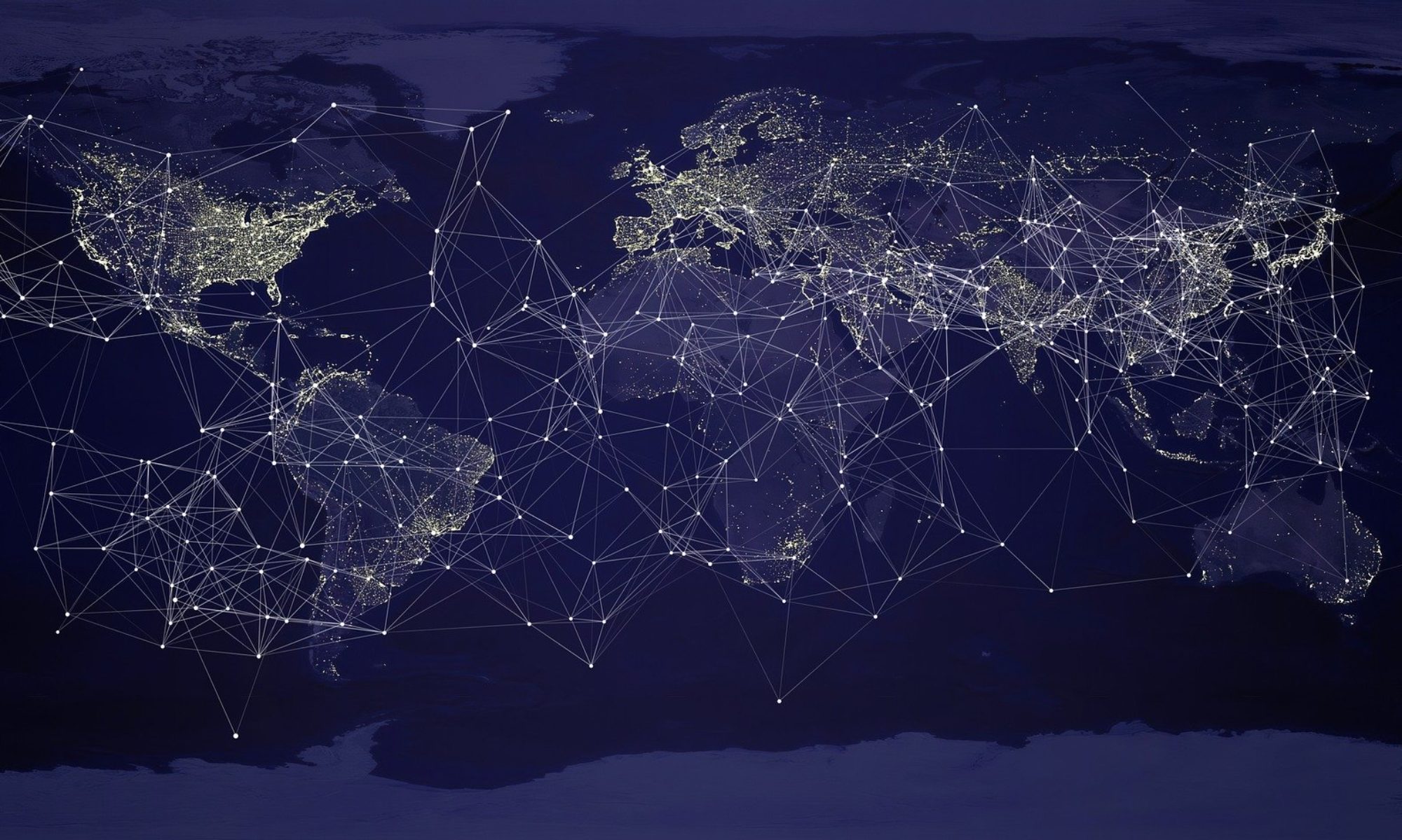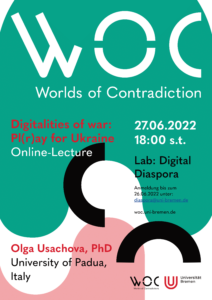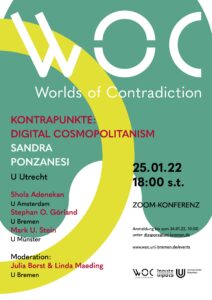The presentation of Olga Usachova (U Padua) in the WoC Digitalities of War – Pl(r)ay for Ukraine event organized by the research lab “Digital Diaspora”, 25 June 2022. Introduction and chair: Stephan O. Görland (U Bremen)
© Olga Usachova

Worlds of Contradictions Lab – University of Bremen
The presentation of Olga Usachova (U Padua) in the WoC Digitalities of War – Pl(r)ay for Ukraine event organized by the research lab “Digital Diaspora”, 25 June 2022. Introduction and chair: Stephan O. Görland (U Bremen)
© Olga Usachova

OLGA USACHOVA (U PADUA): DIGITALITIES OF WAR – PL(R)AY FOR UKRAINE
27 JUNE 2022, 6.00-7.30 P.M.
ONLINE LECTURE
Please click here to see the presentation.
Organizers: Dr. Stephan Görland & the Digital Diaspora Lab
Considering the recent ongoing war in the European continent after more than 75 years of peace and the predominant narrative of “never (war) again”, the Russian invasion of Ukraine showed that militarization could and should be explored not only by paying attention to the materiality but also to the use of information technologies. In this presentation, I aim to showcase the role of information and gaming technologies as a form of resistance to military invasion in Ukraine.
Olga Usachova, PhD in Social Sciences, Interactions, Communication, Cultural Constructions at the Department of Philosophy, Sociology, Education and Applied Psychology (FISPPA) University of Padua, Italy. Her main area of research is socio-technical assemblages in the field of migration and integration of migrants in a host community, as well as the social impact of mobile applications. Her works investigate the process of digitalization in society with attention to refugee apps and other digital initiatives for migrants.
Please register via E-Mail (diaspora@uni-bremen.de) until June 26, 6 PM.

Digital Cosmopolitanism
Guest speaker: Sandra Ponzanesi (U Utrecht)
Discussants: Shola Adenekan (U Amsterdam), Stephan O. Görland (U Bremen) & Mark U. Stein (U Münster)
Introduction and Chair: Julia Borst & Linda Maeding (U Bremen)
This Kontrapunkte-event focuses on the controversy surrounding the concept of cosmopolitanism, which faces the challenges of a present characterized by increased mobility and omnipresent digitality.
On the one hand, „cosmopolitanism“ looks back on a solid tradition and history, but on the other hand, it has changed enormously in the face of increasing globalisation tendencies and post-colonial migration flows at the beginning of the 21st century. These transformations and renegotiations in flux, which are associated with the current understanding of „cosmopolitanism“, also diverge greatly depending on the disciplinary perspective.
Sandra Ponzanesi, Professor of Media, Gender and Postcolonial Studies at Utrecht University, critically examines digital cosmopolitanism as it is lived by today’s migrants and shows, among other things, the disproportion between digital connectivity and social injustice. The controversial and even contradictory meaning of digital cosmopolitanism in a context of post-colonial asymmetries of power as well as the semantic shifts of the concept of cosmopolitanism in the face of transnational migration and digital mobility will be critically examined and explored by fellow discussants from different disciplines.
This event will be held in English.
Please register here until January 24, 10AM.
***
Im Zentrum der Kontrapunkte-Veranstaltung steht die Kontroverse um das Konzept des Kosmopolitanismus, das sich den Herausforderungen einer von gesteigerter Mobilität und omnipräsenter Digitalität geprägten Gegenwart stellen muss.
So blickt “Kosmopolitanismus” zwar einerseits auf eine solide Tradition und Geschichte zurück, hat sich aber andererseits angesichts zunehmender Globalisierungstendenzen und postkolonialer Migrationsströme zu Beginn des 21. Jahrhunderts enorm gewandelt. Diese sich im Fluss befindenden Transformationen und Neuverhandlungen, die mit dem gegenwärtigen Verständnis von “Kosmopolitanismus” verbunden sind, divergieren auch in Abhängigkeit von der fachlich-disziplinären Perspektive stark.
Sandra Ponzanesi, Professorin für Media, Gender und Postcolonial Studies an der Universität Utrecht, setzt sich kritisch mit dem digitalen Kosmopolitanismus auseinander, wie er von heutigen Migrant*innen gelebt wird, und zeigt u.a. das Missverhältnis auf zwischen digitaler Konnektivität und sozialer Ungerechtigkeit.
Die kontroverse und gar widersprüchliche Bedeutung von digitalem Kosmopolitanismus in einem Kontext postkolonialer Machtasymmetrien sowie die semantischen Verschiebungen des Konzepts des Kosmopolitanismus angesichts transnationaler Migration und digitaler Mobilität werden von den
Mit-Diskutanden aus unterschiedlichen Fachdisziplinen kritisch beleuchtet und in ihrem Potenzial ausgelotet.
Die Veranstaltung findet in englischer Sprache statt. Bitte melden Sie sich bis zum 24.01.22, 10 Uhr hier an.
Digital workshop (via ZOOM) University of Bremen
Organizers: Shola Adenekan, Julia Borst, Linda Maeding
| 28 August 2020 | 29 August 2020 |
|
10:00-10:30 Opening & Introduction |
10:00-10:15 Opening |
|
Session 1 – Chair: Linda Maeding |
Session 5 – Chair: Julia Borst |
|
10:30-11:15 Koen Leurs (Utrecht): |
10:15-11:00 Antoinette Torres Soler (Zaragoza): Activismo digital, otredad y nuevas alternativas del pode |
|
Session 2 – Chair: Julia Borst |
Session 6 – Chair: Linda Maeding |
| 11:15-11:40 Ricarda de Haas (Wien): African Diasporic Literatures and/in the Virtual Public Space |
11:00-11:25 Patricia Rocha Antonelli (Tarragona): |
|
11:40-12:00 Gisela Febel (Bremen): |
11:25-11:50 Adrián Menéndez de la Cuesta (Madrid):
|
|
12:05-12:25 Break |
11:50-12:10 Break
|
|
Session 3 – Chair: Shola Adenekan |
Session 7 – Chair: Julia Brühne |
|
12:25-12:50 James Yeku (Kansas): |
12:10-12:35 Danae Gallo González (Giessen): |
|
12:50-13:15 Elizabeth Abena Osei (Düsseldorf): |
12:35-13:00 Carolina Falcão (Pernambuco): |
|
13:15-13:40 Break |
13:00-13:20 Break |
|
Session 4 – Chair: Gisela Febel |
Session 8 – Chair: Julia Brühne |
|
13:40-14:05 Johanna Vollmeyer (Madrid): |
13:20-13:45 Miriam Llamas Ubieto (Madrid): |
|
14:05-14:30 Julia Brühne & Hauke Kuhlmann (Bremen): ‘Extended Diaspora’ – |
13:45-14:30 Concluding discussion |
Conference languages are: English, Spanish, and German.
This workshop is organized by the research lab Digital Diaspora – Imagined Communities in Cyberspace of the interdisciplinary and collaborative research platform “Worlds of Contradiction“ (U Bremen).
With the support of:
DFG (German Research Foundation),
Institut für postkoloniale und transkulturelle Studien (Inputs),
Institut für kulturwissenschaftliche Deutschlandstudien (Ifkud),
University of Bremen.